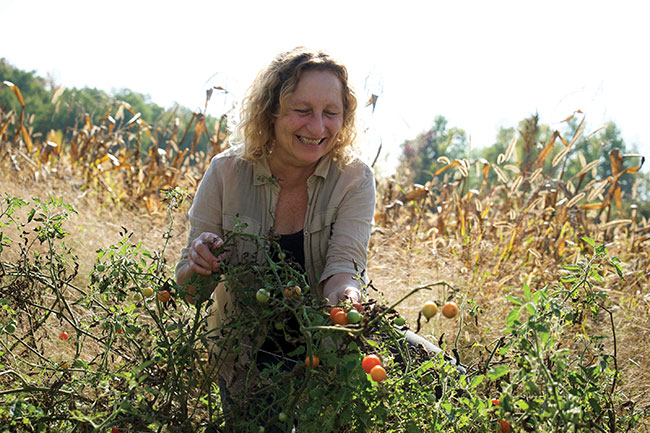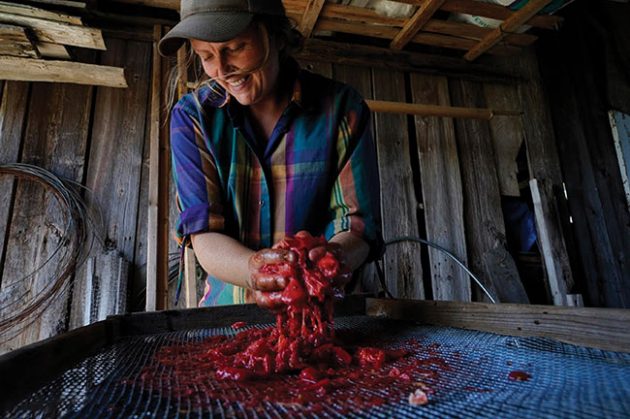
Features
Organic Perspective
Regional vegetable seed systems critical to building resilience
May 28, 2021 By Aabir Dey and Stephanie Hughes
 Kim Delaney, organic seed farmer at
Hawthorn Farm Organic Seeds in Palmerston, Ont. Photo courtesy of Kim Delaney.
Kim Delaney, organic seed farmer at
Hawthorn Farm Organic Seeds in Palmerston, Ont. Photo courtesy of Kim Delaney. “Due to overwhelming demand, our turnaround time is longer than expected.” “We thank you for your patience.” “We are so sorry, but these varieties are out of stock.”
Visit any vegetable seed company’s website this year and you’ll see some kind of message to this effect due to an overwhelming demand for vegetable seed. The pandemic has upended so many systems we previously took for granted, and the vegetable seed system is no different. While this increased demand has generated strong revenue growth for seed companies, it has brought to light some of the complexities of how our vegetable seed is produced.
The vast majority of the vegetable seed planted in Canada – organic or not – comes from imported seed. Most vegetable varieties used in Canada are bred in the U.S. or Europe, scaled up by seed multipliers in the U.S., France, Italy, Israel, China and South Africa, and then sold to North American seed companies wholesale. This mainstream model of importing, repackaging and reselling seed provides high volumes of quality seed to farmers who need consistency and reliability in their seed supply.
However, this system relies on predictability of demand, so seed contracts can be issued to growers around the world well in advance of when that seed will be purchased and planted in Canada. This system leaves most vegetable farmers completely dependent on an opaque network of international suppliers for their most critical input. Organic vegetable farmers are even more vulnerable in this model, as vegetable breeding needs are predominantly directed by large-scale, non-organic vegetable producers. While organic vegetable breeding and seed production are improving, more attention needs to be paid to regionally adapted seed that thrives in organic and climate-resilient farming conditions.
COVID-19 has shown us that our seed systems need to be more resilient. With the impacts of climate change becoming increasingly unpredictable, it is important that we build resilience into our seed systems to ensure farmers across Canada have access to seeds that perform well in their regions.
Regional, small-scale, organic vegetable seed companies – who sell mostly what they grow themselves – are part of the tapestry of farmers in Canada trying to build this alternative. These companies offer regionally adapted, open-pollinated varieties, which are grown in organic or ecological farming conditions. This model moves a much smaller volume, but a higher diversity of seed in Canada. It relies on local transportation and shipping systems and trusting relationships between growers of a similar scale and skill level.
Since 2013, the Bauta Family Initiative on Canadian Seed Security, a SeedChange program, has been working to strengthen these kinds of regional seed systems. In Ontario, we work with the Ecological Farmers Association of Ontario (EFAO) to deliver regional seed programs. We envision a seed system where farmers across Canada are growing a diversity of high-quality, regionally adapted seeds for organic and climate-resilient farming practices.

Annie Richard, seed producer and budding plant breeder with Kitchen Table Seed House in Wolfe Island, Ont. Photo courtesy of Andree Thorpe.
On paper, this sounds great. In practice, it’s a lot more difficult. There are a number of barriers to growing organic vegetable seed in Ontario and the rest of Canada: climatic challenges, absence of agronomic extension, limited domestic plant breeding for organics, and constraints on skilled labour and time for farmers and seed growers. Farming isn’t easy at the best of times, and now, during a pandemic, many organic vegetable farmers are feeling increasingly overwhelmed. There is so much to do and no single farmer or seed company should be expected to do it alone. We share the following suggestions to encourage farmers to think about how they can participate in building a seed system that is more resilient:
Learn how to save organic seed: Learning how to save your favourite open-pollinated varieties on your own farm is a great first step towards regional seed security. If you are an aspiring vegetable seed grower in Ontario, enroll in the Canadian Organic Growers online course on organic vegetable seed production or attend any of the field days, webinars, and workshops on farm-scale seed production held by the EFAO (efao.ca/events).
Conduct an organic variety trial: Conducting on-farm variety trials can help you identify which vegetable varieties are suitable for seed-saving on your farm. Programs like the Canadian Organic Vegetable Improvement Project (seedsecurity.ca/302-canovi) and the EFAO’s Farmer-Led Research Program help farmers design and conduct variety trials to help identify the best performing open-pollinated vegetable varieties for their area.
Grow organic seed on contract: Already know how to save seed? There’s never been a better time for skilled organic vegetable growers to get into the seed contract business. Contact a local organic vegetable seed company in your area (weseedchange.org/local-seeds) to see if they would be interested in purchasing seed from you.
In time, the impacts of the pandemic will pass, but climate change and other ecological, economic and political challenges will continue to test the resilience of our agricultural systems. Knowing how to develop and grow a diversity of quality seeds that thrive in Canadian organic and ecological farming systems is a critical step towards building that resilience in Canada.
To learn more about what you can do for seed security, visit takeactionforseeds.ca. To learn more about The Bauta Family Initiative on Canadian Seed Security, visit seedsecurity.ca. To learn more about how you can get involved in seed security programs in Ontario, visit efao.ca/seed-security.
The Organic Council of Ontario (OCO) represents more than 1,400 certified organic operators, as well as the businesses, organizations, and individuals that bring food from farm to plate. OCO works to catalyze sector growth, support research, improve training, increase data collection, encourage market development, protect the integrity of organic claims, and inform the public of the benefits and requirements of organic agriculture. •
Print this page